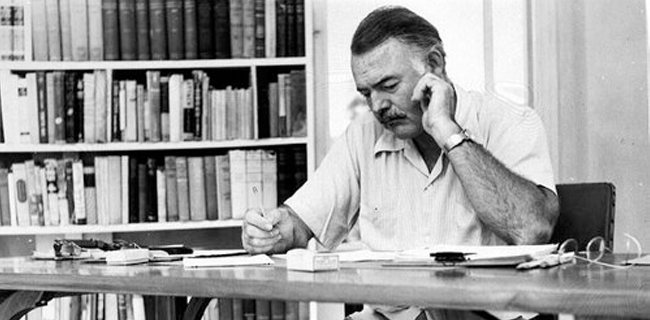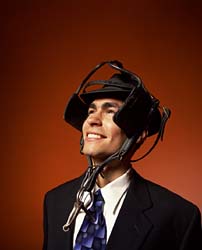Are you a good writer?
The answer to that question has never been more important. Between emails, text messages, and blog posts, we’re writing more than ever.
If you own your own website, you know that good writing means more search-engine traffic, more social shares, and ultimately more customers. Bad writing means being ignored.
Become a better writer with the 20 tips below:
#1 Read More

“If you don’t have the time to read, you don’t have the time or the tools to write.”
Stephen King
Don’t expect to be a great writer unless you’re familiar with great writing. Seek out writers that you admire and make reading their work part of your daily schedule.
Their skill with words will seep into your sub-conscious and start showing up in your own writing.
#2 Listen to “Writing Music”
Not all music is created equal. Some music makes you dance, some makes you cry, and some makes you write.
For me, slow-tempo piano compositions make for great “writing music”.
You can put together your own writing playlist to put you in the mood when you write, but you don’t have to. Click here to begin listening to an 8tracks playlist created specifically for writing (it will open in a new window).
#3 Know Your Audience

We’ve spent so much time thinking of writing as an abstract collection rules and principles that we sometimes forget that our words are eventually read by real people.
Ultimately, it’s our writing’s ability to communicate powerfully to these individual people that determines if it’s any good.
That’s why it’s important to learn as much as you can about the people who are reading your work. Find out their average age, gender, and location. More importantly, find out about their lifestyles, aspirations, and problems.
You can do this by putting a poll on your website or simply by following up with comments and retweets. The more you know about your audience, the better you’ll be able to help them.
Photo Courtesy of Anirudh Koul.
#4 Do Your Research
I’ve never liked doing research, but I’ve always liked the effect it has on my writing.
The better informed you are on your subject, the more informative and valuable your article can be. Research thoroughly and you’ll know just what to write for every section.
#5 Write with Confidence
Do you want to impact people with your writing?
Then be direct, passionate, and unyielding. Take a stand.
Don’t hedge. Don’t use the passive voice. Don’t begin sentences with, “I think.”
Your readers deserve a confident message. If you don’t believe fully in what you’re saying, then why are you writing it?
#6 Make it Easy to Read
“When something can be read without effort, great effort has gone into its writing.”
Enrique Jardiel Poncela
At some point in school, most of us decided that good writing had big words and complex sentences. Ever since, we’ve been cramming our paragraphs with syllables and commas.
But the best writing is so simple that it’s almost like it’s not there at all. You read a sentence and its meaning just slips comfortably into your brain.
Always choose clarity over complexity.
#7 Write Without Stopping
“Don’t get it right, just get it written”
James Thurber
Free writing is the practice of writing without stopping for a set period of time. Your fingers never stop moving. If you can’t think of what to write next, you simply continue to write the previous word until something else comes to you.
This may sound ridiculous and, obviously, the result will be full of grammar errors and run-on sentences. But there’s something powerful about the stream-of-consciousness that free writing produces. There’s also something powerful about producing a page of words in just minutes.
Give free writing a try some time and see if you’re not surprised by the results.
#8 Don’t Chase Perfection
Maybe you’ve been a great writer since you could first lift a crayon.
You’ve probably got a healthy confidence in your writing. But you’ve also probably got some unrealistic expectations. If you think everything you write needs to be perfect, then you’ll struggle to ever get words on paper.

“We are all apprentices in a craft where no one ever becomes a master.”
Ernest Hemingway
If Ernest Hemingway considered himself an apprentice-level writer, then what does that make the rest of us?
Writing is impossible to master. So while your articles should be well-crafted, they shouldn’t be perfect.
#9 Take Risks
“Creativity is allowing yourself to make mistakes. Art is knowing which ones to keep.”
Scott Adams
Part of the creative process is adopting a mindset where anything is possible. The best writers explore these possibilities, even when the chances of them working out are slim.
For instance, it’s probably a mistake to start your article with a dialogue between two fictional characters. Then again, it could be totally brilliant. You’ll never know unless you’re willing to take that risk.
Next time you get a risky idea, explore it. Even if you don’t keep the results, you’ll likely have learned something that you can bring into your final draft.
#10 Understand that Writing Online is Different
Online writing can be multimedia, so always be looking for opportunities to enrich your article with images, audio, or video. It can also be interactive. Linking out to useful information and websites is a courtesy to your readers. Since online writing is global, you may want to avoid using colloquial expressions or relying on cultural references that will only be understood by people in your country.
One of the most commons mistakes people make while writing online is using too many long paragraphs. While five sentence paragraphs are the norm in academic writing, online readers are turned off by big blocks of text. When I’m writing for the web, I’ll rarely use more than three sentences in a paragraph.
#11 Use Your Voice
“Be yourself. Above all, let who you are, what you are, what you believe, shine through every sentence you write, every piece you finish.”
John Jake
Have you ever finished reading an article and felt like you had just made a real-life connection with the author?
Voice is the word for when writers let their personality shine through in their writing. It’s more engaging to read and it helps people relate to you as a real human being. So loosen up.
#12 Record Yourself Talking
If you’ve already got a great idea for what you want to write about but you’re having trouble putting it on paper, try recording yourself talking it out.
Talking is simply easier than writing and it helps us to get to the heart of things.
When you reach a good stopping point, play back the audio and transcribe it. The result will be raw, but it will also be a great starting place for your article. It’s also a good way to give your writing stronger voice.
#13 Put Your Blinders On

Q: What do writing and performing brain surgery have in common?
A: Both require your full attention.
Writing on a computer can be a constant battle of distraction. But in order to work efficiently, a writer must be very focused.
That’s why, as I type this sentence, I only have one program running (my word processor) and my Wifi radio is disabled.
Yes, the Internet is an amazing research tool. But you don’t benefit from being connected to it the entire time you’re writing. Collect the information you’ll need before you begin writing and then disconnect.
#14 Do More
“Writing comes more easily if you have something to say.”
Sholem Asch
We write best from experience.
If you’re having trouble coming up with good ideas for new articles, maybe the problem is that you don’t have very much to say about your niche.
So throw yourself fully into the subject of your writing. Try something different. Learn something new. Make a new connection in the industry. The broader experience you have to draw from, the easier it is to write.
#15 Write to One Person
When we think about the thousands of different people who will eventually read our words, we tend to write very broadly so that all of them will understand what we’re saying.
That’s a nice idea, but broad writing is typically uninspiring. When you try to include everybody, you just make everybody bored.
Instead, create a single, imaginary person who represents your target audience. Write your article as if you’re talking to that one individual. Without trying, you’ll find that your writing becomes more specific and intimate. And you’ll be surprised by how many people feel like you were writing just for them.
#16 Don’t Forget About Search Engines

Your audience isn’t just people. Search engine spiders are also “reading” your articles in order to rank you for keyword phrases.
So what do Google’s spiders like to read?
They like longer content (think 2,000-4,000 words). It also helps if you incorporate your chosen keywords throughout the headings and body (without over-doing it). A little keyword research would be a good idea before you begin writing your next article.
Your human audience is, of course, more important – and their linking, sharing, and +1’ing your content will certainly help with your search rankings. But paying a little bit of attention to the reading habits of Google will help ensure that human readers are actually able to find your writing in the first place.
#17 Don’t Take it Personally
Writing is a personal thing. You’re pulling thoughts out of your head and putting them into sentences for complete strangers to read.
This is part of the reason people suffer from writer’s block: we let our thoughts about writing get tangled up with our thoughts about ourselves. But your writing isn’t a reflection of your worth as human being.
Cultivate a sense of detachment from your writing. The more separate you feel from the words on the page, the more freely you’ll be able to produce them.
#18 Trim the Fat
“I try to leave out the parts that people skip.”
Elmore Leonard
I often write whole sections to an article that I later realize were unnecessary. When that happens, I’m forced to highlight the paragraphs and press ‘delete’.
It’s difficult to cut out something you may have spent a half-hour perfecting, but it’s also necessary. If you force your audience to read something that they don’t benefit from, you’re wasting their time. They’ll stop reading – even if the rest of the article is spot-on.
#19 Read it Out Loud
Writers get very close to their writing. Maybe too close.
By the time you’ve rewritten a sentence a few times, you know it so well that you can’t read it objectively. Since you know what you’re trying to say, you’ll understand the sentence even if it’s awkward or confusing.
That’s why using just your eyes to re-read your article before you click ‘publish’ isn’t good enough.
Read over your writing with your mouth and take note of every time you stumble over your words. Then rewrite those parts so that they sound natural when you say them out loud.
#20 Only Writing is Writing
“You have to sit your butt in the chair and write. You have to do that every day. That doesn’t mean you lie on your couch and play with your navel. That doesn’t mean you go shopping when the words don’t flow the way you think they should. That never works. It means you sit your butt in the chair and get to work. No excuses.”
Harlan Coben
I spend a lot of time thinking about what I need to write. Sometimes I even fool myself into thinking that I’m being productive. But the only way to make progress in your writing is to do write – pages and pages, day after day.
You’ve finished reading. Now get to writing.
[facebooksimplelike]


0 comments:
Post a Comment